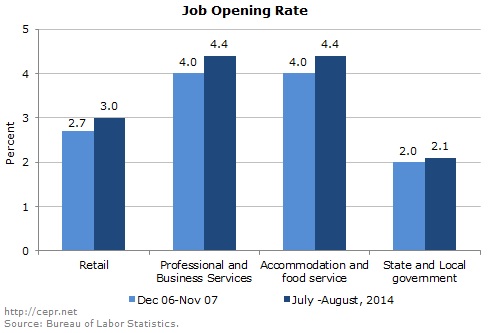November 01, 2014
For the last several years there has been a regular drumbeat of business people, economists, and pundits telling us that the economy’s real problem is that workers lack the skills necessary to fill the jobs that are available. From this perspective, the problem is not that the economy lacks demand; the problem is that our workers need more education and training. In other words, don’t blame the folks in Washington for mismanaging the economy; blame the workers for being dumb.
This crew got a little ammunition for this argument recently when the job opening rate rose back to its pre-recession level. The job opening rate is the number of job openings that firms are listing divided by the number of people employed. The rise of the job opening rate to its pre-recession level could be taken as meaning that companies are having a hard time finding qualified workers even though measures of employment, unemployment, and involuntary part-time employment all seem to imply substantial slack in the labor market.
Before we rush to retrain and re-educate the millions of unemployed and underemployed workers it is worth looking at the job opening data a bit more closely. In most sectors, the job opening rate is still somewhat below the pre-recession level. However, there are some exceptions as shown in the figure below.

Source: Bureau of Labor Statistics.
There are several items that are worth noting about the sectors of the economy in which employers appear to be having trouble finding workers by the job opening rate measure. First, these are not especially high skilled areas. In fact, the retail and accommodation and food service (i.e. hotels and restaurants) stand out as being among the lowest paying sectors in the economy, with the least educated workers.
The professional and business services sector has a wide mix of jobs, many of which are highly skilled. However it is likely that most of the job opening are in the temporary help sector, which has the most turnover and therefore the most need for listing job openings. Furthermore, while the job opening rate presently is higher than in the year immediately preceding the recession, it is slightly lower than the 4.5 percent rate in 2005. This means that there is no more basis for claiming a skills mismatch in this sector today than in 2005.
Finally, there is a slight increase in the job opening rate in the state and local government sector compared with pre-recession levels. This could mean that state and local governments are having trouble getting good workers. This actually may be somewhat true.
A number of politicians across the country have made a point beating up on public sector workers in general and teachers in particularly. They also have cut their pay and benefits in many cases. It would not be surprising if the scorn and lower pay has made these jobs less attractive to workers who have alternatives. For this reason it is quite plausible that many adminstrators in state and local government are having trouble to get good workers to fill vacancies.
In short, there is not much of a story in the job openings data to support a skills mismatch. There is reason to believe that employers don’t seem willing to pay to get the workers they say they need. This suggests that if there is a problem of inadequate skills it is on the part of employers who apparently do not understand how markets work.






